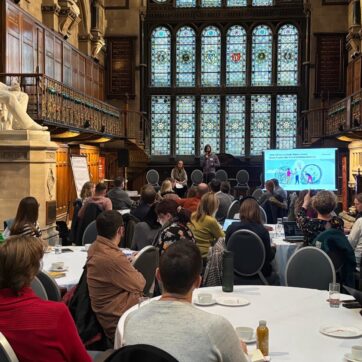As the number of children living in poverty grows, academic research is informing a UK-wide, cross-party inquiry on how we can ensure that children get the nourishment they need. Its report will be launched in Westminster on 25th April 2019.
One in three children (4.1million) are living in poverty in the UK. UNICEF estimates 2.5 million (19%) British children now live in food insecure households. This means that there are times when their family does not have enough money to acquire enough food, or they cannot buy the full variety of foods needed for a healthy diet. 10% of these children are further classified as living in severe food insecurity (the European average is 4%) and as a result are set to experience adverse health outcomes. The rates of hospital admissions due to rickets (a disease largely caused by severe malnutrition in the early stages of childhood) are at their highest for fifty years. There is also increasing evidence of childhood stunting (impaired growth and development resulting from poor nutrition). A recent academic study found that children living in some of the most economically deprived regions of England were on average more than a centimetre shorter in height by the age of 10 years than those living in the most economically advantaged areas. In schools where the majority of pupils are entitled to receive free school meals, teachers are reporting that they are regularly observing hungry children filling their pockets with any leftovers they can find so that they have something to eat for their evening meal. Outside term times, “holiday hunger” is now widespread and many are left relying on ‘free meals’ offered by clubs and schemes run by local charities as their main source of food.
In recent months I has been working with The Food Foundation, an independent think tank that tackles the growing challenges facing the UK’s food system, on the analysis of submissions to the final report of the Children’s Future’s Food Inquiry . This is a Parliamentary Inquiry into Children’s Future Food that has the support of a cross party group of 14 parliamentarians, two All Party Parliamentary Groups and the Children’s Commissioners in all four UK nations . The final report features data gathered from interviews and group discussions with children and young people aged between 10 and 20 years old who are currently experiencing food poverty. It also includes expert evidence submitted from children’s centres, food banks, schools, health care professionals, academics, faith organisations, housing associations, community advice centres, holiday kitchens and arms length bodies. The inquiry aims to build a national consensus on what needs to be done to prevent children’s food insecurity and to ensure their food is both nourishing and sets them up for a healthy and productive future. Dame Emma Thompson will be launching the Children’s Future Food Inquiry and its official report on 25th April 2019 at The Assembly Hall, Church House, Dean’s Yard, Westminster. For further information see:
www.eventbrite.co.uk/e/childrens-future-food-inquiry-launch-tickets-56923096514?aff=ebdsorderfblightbox
Prof Iain Wilkinson is Professor of Sociology at the University of Kent’s School of Social Policy, Sociology and Social Research.
Author: Prof Iain Wilkinson, Professor of Sociology at the University of Kent


